Going home after attending BOSC was a little bittersweet. It’s my favorite conference because it brings together such a welcoming group of people, and the lineup of talks typically offers a great balance of technical learning and community-building insights. So on my flight home, I was coasting on dopamine from the good times, but also getting a little sad that it was over for this year. With the help of a few fellow BOSC enthusiasts (special shout-out to Nomi Harris for the event summary notes, photos and help recruiting contributors), I put together this little recap of the conference, with highlights and personal accounts contributed by a number of other participants. I couldn’t fit everything people shared into the blog post, but you can find the full quotes in the original google doc.
The 4-1-1 on BOSC 2022
If you’re not already familiar with it, BOSC stands for Bioinformatics Open Source Conference, and we just completed the 23rd edition — BOSC 2022 — as a “COSI” track, or Community Of Special Interest, within the ISMB meeting of the International Society for Computational Biology (ISCB). It was a hybrid conference, with the in-person component hosted in beautiful Madison, Wisconsin (USA). Presenters are encouraged to publish their slides and/or posters as part of the BOSC collection on F1000 Research. This year’s BOSC included two joint keynotes with the Education and Bio-Ontologies COSIs, which multiple people highlighted as some of their favorite parts of the conference. Given the overlaps in terms of interests and methodologies between these COSIs, I thought it was especially great that the Education COSI itself took place the day before the BOSC COSI. To my delight I was able to catch a number of their talks without having to make tough track-preference decisions. (I loved to see how many people are creating portable materials using Jupyter Notebooks, in some cases with the explicit goal of distributing them on the cloud.)
Day 1: Education, standards, tools and more
The first day of BOSC proper kicked off with a welcome from chair Nomi Harris and an overview of BOSC’s parent organization, the Open Bioinformatics Foundation, by Chris Fields, who highlighted some opportunities to get involved with the OBF. I may have volunteered to be the new OBF Newsletter editor; you’ll know it’s for real if I ever manage to get the post-BOSC newsletter out! Next was a joint keynote (BOSC/Education COSI) by Jason Williams entitled “Riding the bicycle: Including all scientists on a path to excellence”. Jason discussed principles for making short-format training (aka “bootcamps”) more effective and persistent. Next was a joint keynote (BOSC/Education COSI) by Jason Williams entitled “Riding the bicycle: Including all scientists on a path to excellence”. Jason discussed principles for making short-format training (aka “bootcamps”) more effective and persistent.
Next was a joint keynote (BOSC/Education COSI) by Jason Williams entitled “Riding the bicycle: Including all scientists on a path to excellence”. Jason discussed principles for making short-format training (aka “bootcamps”) more effective and persistent. Next was a joint keynote (BOSC/Education COSI) by Jason Williams entitled “Riding the bicycle: Including all scientists on a path to excellence”. Jason discussed principles for making short-format training (aka “bootcamps”) more effective and persistent. 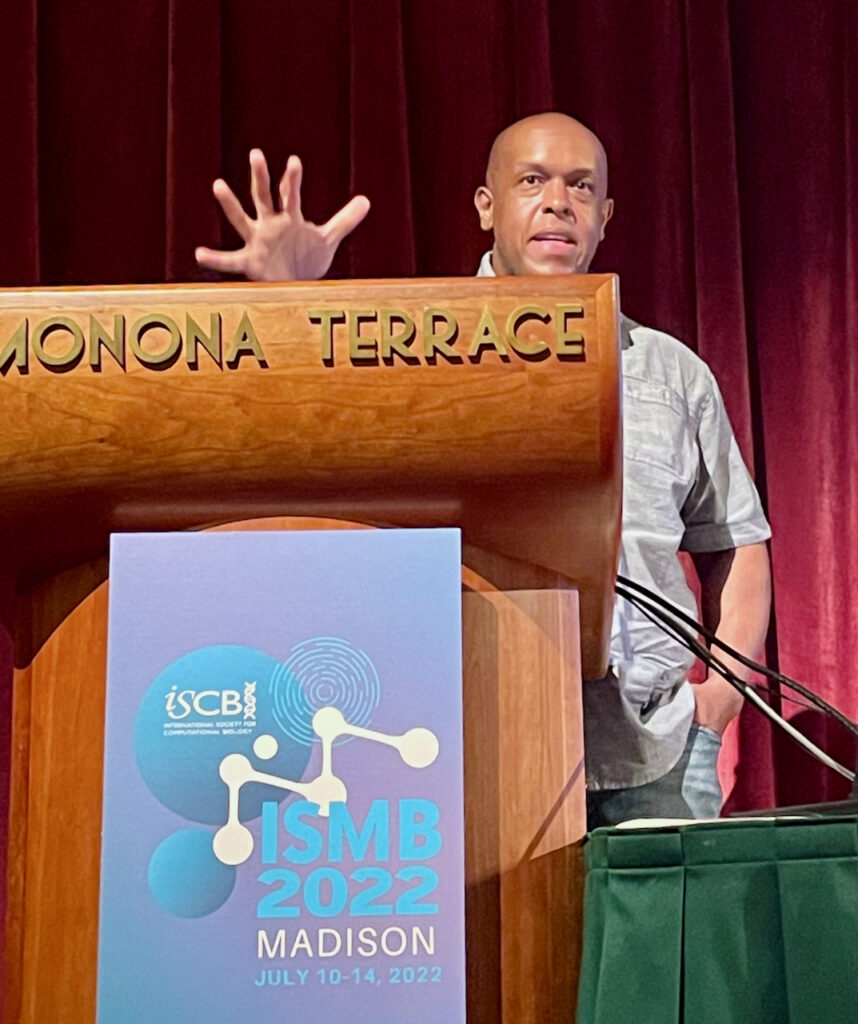 Let me do you a big favor here and point you to a recorded version of the same talk that Jason posted on Youtube, because googling “jason williams riding the bicycle” will not give you the results you’re looking for (unless you’re into stories about cycling for charity — but it’s a different Jason). You should also check out Jason’s blog post on lifesciencetrainers.org, which summarizes the concept of the “Bicycle Principles” and calls for community involvement. As Hilmar Lapp commented, “Jason Williams set the perfect tone with his keynote: trying to be as professional as you can about whatever your pursuit is matters, for yourself and those who your work affects, and don’t ever forget to regularly laugh and have fun while doing it. A timely reminder after both got increasingly crowded out by a pandemic of other concerns.“After the keynote, BOSC had themed sessions about “Standards and Practices for Open Science”, “Analysis tools & approaches”, “Data access and visualization”, and “Standards for Open Science”. There were too many great talks to mention all of them, but I will say I was excited to see that several talked explicitly about leveraging GA4GH standards. Brian Repko, echoing this sentiment, called out the Phenopackets schema in particular, which provides a human and machine-readable way to structure phenotypic data about a patient or individual. As Monica Munoz-Torres announced joyfully in her talk, Phenopackets version 2.0 was released earlier this year as a major upgrade to the original schema, which represents the culmination of a huge amount of work — so congratulations to the Phenopackets team on their achievement!During the lunchtime poster session, participants checked out 42 BOSC posters and learned about a variety of bioinformatics tools and initiatives. Connections were made, cards and emails were exchanged, and perhaps next year we’ll hear talks about new collaborations that were sparked here.
Let me do you a big favor here and point you to a recorded version of the same talk that Jason posted on Youtube, because googling “jason williams riding the bicycle” will not give you the results you’re looking for (unless you’re into stories about cycling for charity — but it’s a different Jason). You should also check out Jason’s blog post on lifesciencetrainers.org, which summarizes the concept of the “Bicycle Principles” and calls for community involvement. As Hilmar Lapp commented, “Jason Williams set the perfect tone with his keynote: trying to be as professional as you can about whatever your pursuit is matters, for yourself and those who your work affects, and don’t ever forget to regularly laugh and have fun while doing it. A timely reminder after both got increasingly crowded out by a pandemic of other concerns.“After the keynote, BOSC had themed sessions about “Standards and Practices for Open Science”, “Analysis tools & approaches”, “Data access and visualization”, and “Standards for Open Science”. There were too many great talks to mention all of them, but I will say I was excited to see that several talked explicitly about leveraging GA4GH standards. Brian Repko, echoing this sentiment, called out the Phenopackets schema in particular, which provides a human and machine-readable way to structure phenotypic data about a patient or individual. As Monica Munoz-Torres announced joyfully in her talk, Phenopackets version 2.0 was released earlier this year as a major upgrade to the original schema, which represents the culmination of a huge amount of work — so congratulations to the Phenopackets team on their achievement!During the lunchtime poster session, participants checked out 42 BOSC posters and learned about a variety of bioinformatics tools and initiatives. Connections were made, cards and emails were exchanged, and perhaps next year we’ll hear talks about new collaborations that were sparked here.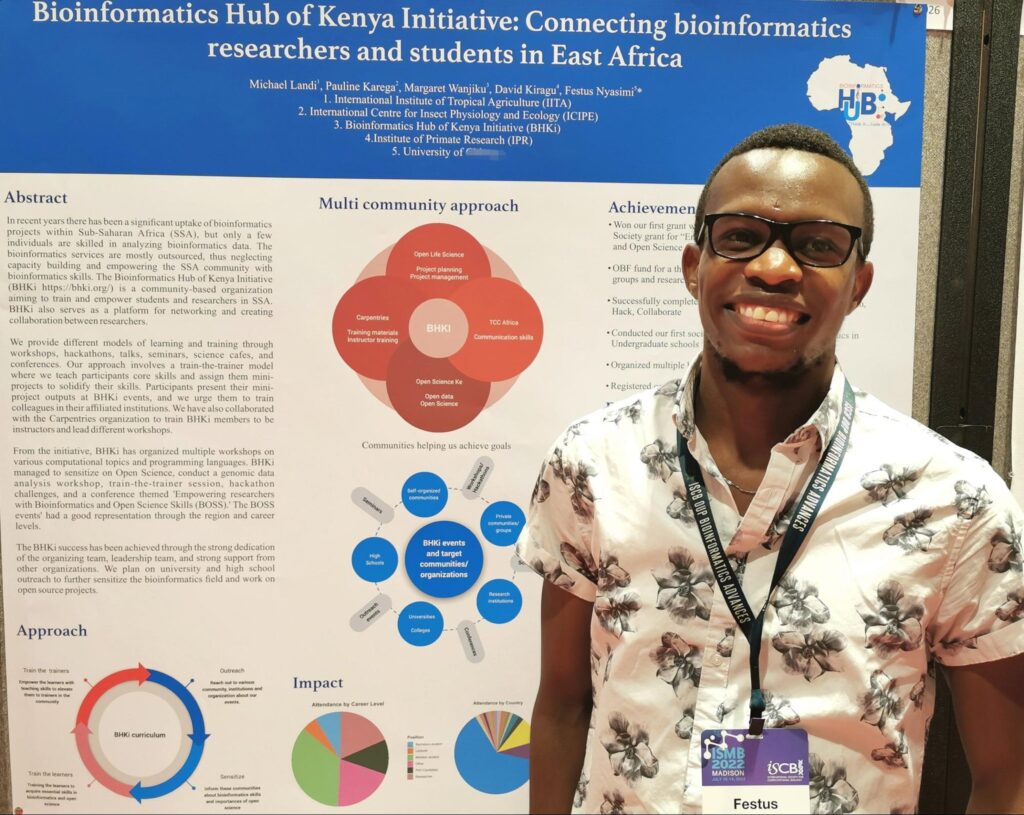
Day 2: Workflows, ontologies and inclusion
The second day of BOSC started with a session about “Workflow Management Systems”, including a number of talks related to CWL, aka the Common Workflow Language that grew out of a BOSC CodeFest in 2014. In that same session, I gave a talk about WDL, the Workflow Description Language that grew out of the Broad Institute’s GATK pipeline engineering group and is now stewarded by the OpenWDL community project. Check out my blog post and recording (+ slides on F1000) if you’re interested in a method for deciphering any WDL workflow handed to you by a perfect stranger. The workflows session was delayed by some technical issues, but session chair Hervé Ménager kept his cool throughout the back and forth with the local A/V team. Hervé himself commented “Despite the many technical issues we had with running the Workflow Management Systems session of BOSC, I was really impressed with the patience and understanding of the audience and the speakers, who all went out of their way to try and keep us on track, so that every presenter could get the opportunity to speak.” And it’s true, the BOSC crowd stayed pretty chill when things went, uh, pear-shaped. Ahem. The session after lunch was a joint session with the Bio-Ontologies COSI, featuring a keynote by Melissa Haendel, “The open data highway: turbo-boosting translational traffic with ontologies.” Melissa discussed ways to bridge the translational divide by leveraging semantics and robust ontologies — with the caveat that in most cases, if you think you need to invent a new ontology, you actually don’t. Her talk was very well received and highlighted by multiple people as a conference favorite; though for my money, Brian Repko said it best: “My internal notes for Melissa’s keynote literally says ‘HOLY COW THIS IS GREAT’". 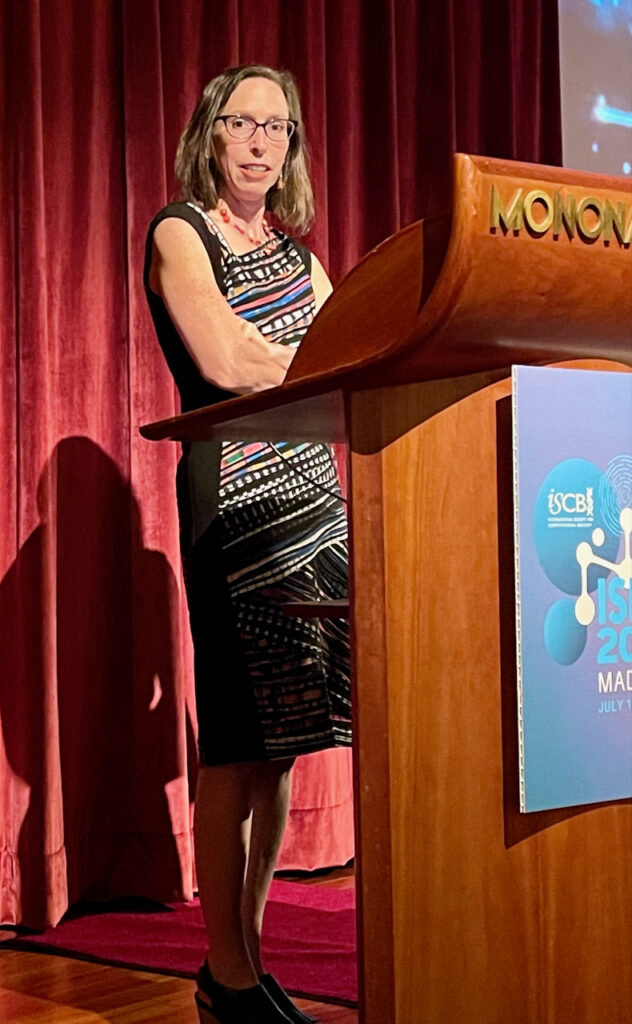 BOSC ended with a panel entitled “Building and Sustaining Inclusive Open Science Communities” moderated by Jason Williams, with a fantastic roster of panelists known for their work advancing diversity and inclusion. Being themselves members of groups that are underrepresented in our field, they spoke eloquently of challenges and opportunities that we can all tackle as a community. As Nicole Vasilevsky noted, “Jason did a great job facilitating and the discussion was very thought provoking”. Among key takeaways, “the panel reminded us that we all have much more agency than we think in making spaces welcoming to everyone who wants to enter,” reflected Hilmar.
BOSC ended with a panel entitled “Building and Sustaining Inclusive Open Science Communities” moderated by Jason Williams, with a fantastic roster of panelists known for their work advancing diversity and inclusion. Being themselves members of groups that are underrepresented in our field, they spoke eloquently of challenges and opportunities that we can all tackle as a community. As Nicole Vasilevsky noted, “Jason did a great job facilitating and the discussion was very thought provoking”. Among key takeaways, “the panel reminded us that we all have much more agency than we think in making spaces welcoming to everyone who wants to enter,” reflected Hilmar.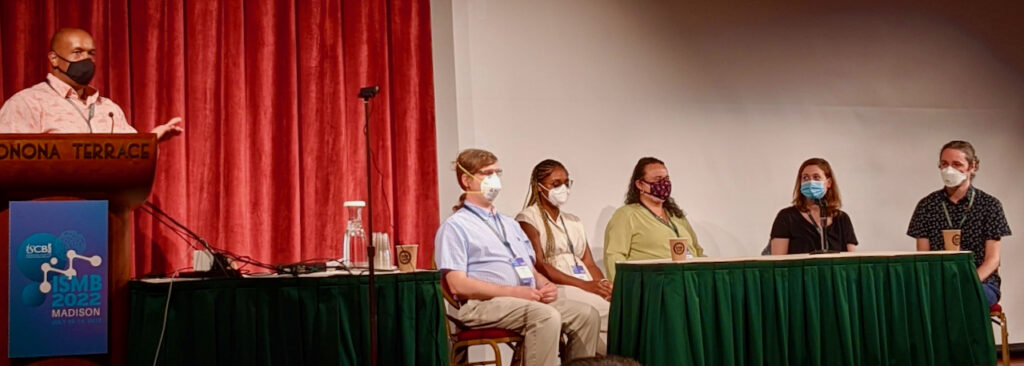 The high level of enthusiasm for the panel was palpable both during the event and in the comments we collected afterward. I read this as a clear sign that the majority of the participants genuinely care about inclusion, which in itself suggests that this community is on the right track. As a long-time community member, Nomi commented, “I’m pretty sure this was the first BOSC, maybe even the first ISMB, where one of the attendees was a [service] dog. Which of course is great regardless, but more seriously, it represents tangible progress in our efforts to make BOSC more inclusive and accessible.” Early feedback from newcomers certainly seems encouraging. “As someone who got into bioinformatics just before the pandemic, it was great to finally be around ‘my people’” wrote Bhavesh Patel, first-time BOSC participant, adding “All the talks were great, but I especially loved the panel discussion on diversity and inclusion. It is a wonderful initiative and I hope it becomes a frequent occurrence at all conferences.“And that is a really nice note to end a conference on, isn’t it?
The high level of enthusiasm for the panel was palpable both during the event and in the comments we collected afterward. I read this as a clear sign that the majority of the participants genuinely care about inclusion, which in itself suggests that this community is on the right track. As a long-time community member, Nomi commented, “I’m pretty sure this was the first BOSC, maybe even the first ISMB, where one of the attendees was a [service] dog. Which of course is great regardless, but more seriously, it represents tangible progress in our efforts to make BOSC more inclusive and accessible.” Early feedback from newcomers certainly seems encouraging. “As someone who got into bioinformatics just before the pandemic, it was great to finally be around ‘my people’” wrote Bhavesh Patel, first-time BOSC participant, adding “All the talks were great, but I especially loved the panel discussion on diversity and inclusion. It is a wonderful initiative and I hope it becomes a frequent occurrence at all conferences.“And that is a really nice note to end a conference on, isn’t it?
Add-on #1: Scheduled dinners
But wait, there’s more! BOSC folks are a surprisingly social group, for a bunch of bioinformatics nerds (no offense y’all). So in addition to the daytime conference programming, the organizing committee had organized (as they do) two outdoor dinners for BOSC participants to get together and keep the conversations going. 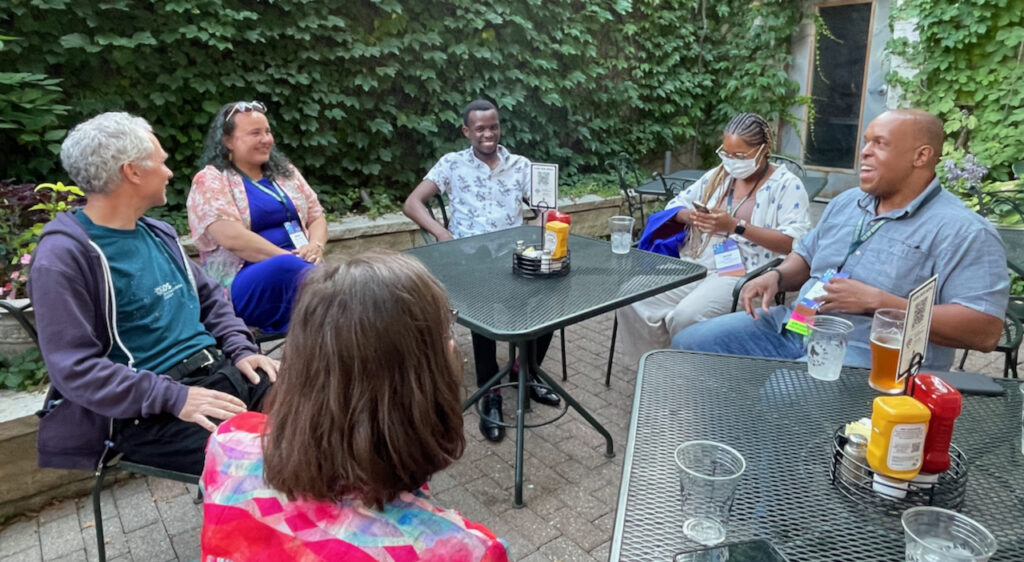 Just about everyone who attended the dinners raved about how great they were, to a point that might be borderline obnoxious to anyone who didn’t go; but I can tell you from first-hand experience it’s all justified. And to be clear, it was “pay-your-own-way” (aka BYO wallet), so the enthusiasm wasn’t about getting a free meal on the dime of some corporate sponsor — it was all about the friendly company and congenial atmosphere. “The dinner was […] a great opportunity to interact with other participants in a laid-back setup,” wrote Bhavesh. As Nomi noted, we were very lucky with the weather, so we were able to hang out, dine and socialize on the outdoor patios until well after nightfall.
Just about everyone who attended the dinners raved about how great they were, to a point that might be borderline obnoxious to anyone who didn’t go; but I can tell you from first-hand experience it’s all justified. And to be clear, it was “pay-your-own-way” (aka BYO wallet), so the enthusiasm wasn’t about getting a free meal on the dime of some corporate sponsor — it was all about the friendly company and congenial atmosphere. “The dinner was […] a great opportunity to interact with other participants in a laid-back setup,” wrote Bhavesh. As Nomi noted, we were very lucky with the weather, so we were able to hang out, dine and socialize on the outdoor patios until well after nightfall.  There was definitely a sense that this felt especially good because we had all been deprived of this kind of interaction for over two years. Nomi shared that for her, “the best moments [of the conference] were not the talks (though of course those were great!) but the personal interactions that I have missed so much the last few years.” As Hilmar pointed out, “The BOSC socials and CoFest showed how much it is worth even to just be together again. Not that we didn’t know, but knowing and understanding are not always the same thing.” This sentiment, which almost everyone who was there in person echoed in some way, does raise the question of how we can provide quality social interaction for those in our community who cannot yet come back to in-person events — or for those who have never been able to do so due to the circumstances of their lives or their geography. As Tazro Ohta remarked eloquently, “What I learnt during the pandemic was: The power of online meetings that connect people and the power of time differences that prevents me from attending them helding in a western time zone.” That is a topic I expect we will have to explore as we iterate on the hybrid event models that are likely to shape the future of scientific gatherings.
There was definitely a sense that this felt especially good because we had all been deprived of this kind of interaction for over two years. Nomi shared that for her, “the best moments [of the conference] were not the talks (though of course those were great!) but the personal interactions that I have missed so much the last few years.” As Hilmar pointed out, “The BOSC socials and CoFest showed how much it is worth even to just be together again. Not that we didn’t know, but knowing and understanding are not always the same thing.” This sentiment, which almost everyone who was there in person echoed in some way, does raise the question of how we can provide quality social interaction for those in our community who cannot yet come back to in-person events — or for those who have never been able to do so due to the circumstances of their lives or their geography. As Tazro Ohta remarked eloquently, “What I learnt during the pandemic was: The power of online meetings that connect people and the power of time differences that prevents me from attending them helding in a western time zone.” That is a topic I expect we will have to explore as we iterate on the hybrid event models that are likely to shape the future of scientific gatherings.
Add-on #2: Collaboration Fest (CoFest)
Ok we’re almost done, but I still have to tell you about CoFest, a two-day “collaboration fest” that takes place informally after the conference, in which a subset of BOSC participants stick around for a couple of days to work together on some projects. Those projects can involve coding, but also documentation or other non-coding activities, so anyone can contribute regardless of their technical background. In fact, for my CoFest project, I started working on the upcoming OBF newsletter issue. You can see the full set of projects that were undertaken at this year’s CoFest in the status update slide deck. Out of the six projects that were proposed this year, three were worked on by remote CoFest participants while the other three were worked on by the in-person group. Those of us who attended CoFest in person worked at the Madison Public Library on the first day, and we had ourselves a nice little sunset social on the waterfront with beer and brats. On the second day, we relocated to the airport to accommodate the group’s wide range of departure times, and “cofested” variously from the pre-security lounge, from our respective gates, and from the air, because sometimes it’s just that hard to let a good thing go.  In-person CoFesting from the Madison airport lounge. Don’t judge me, I only took off my mask for the photo! In my experience, CoFest is as much about community building as it is about making progress on a project. As Bhavesh, our BOSC first-timer who also attended CoFest, observed, “The cofest was my favorite part as it provided a very informal setting to get to know all the participants on a personal level. It also gave me a unique opportunity to discuss personally with experts of the field and get one-on-one feedback on my work.” In fact, he added, “I would highly recommend anyone new to BOSC to join the cofest!“So don’t miss your opportunity to get in on the fun, and make sure to add BOSC to your must-go list of conferences for next year (whether remotely or in-person). BOSC 2023 will be part of ISMB/ECCB 2023 and will be held in Lyon, France between July 23-27 (exact dates TBD).I hope to see you there/onscreen!
In-person CoFesting from the Madison airport lounge. Don’t judge me, I only took off my mask for the photo! In my experience, CoFest is as much about community building as it is about making progress on a project. As Bhavesh, our BOSC first-timer who also attended CoFest, observed, “The cofest was my favorite part as it provided a very informal setting to get to know all the participants on a personal level. It also gave me a unique opportunity to discuss personally with experts of the field and get one-on-one feedback on my work.” In fact, he added, “I would highly recommend anyone new to BOSC to join the cofest!“So don’t miss your opportunity to get in on the fun, and make sure to add BOSC to your must-go list of conferences for next year (whether remotely or in-person). BOSC 2023 will be part of ISMB/ECCB 2023 and will be held in Lyon, France between July 23-27 (exact dates TBD).I hope to see you there/onscreen!